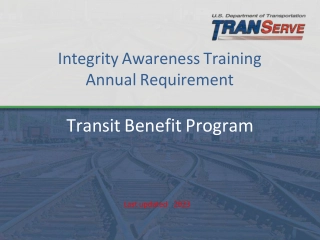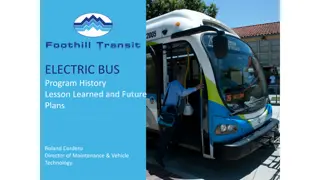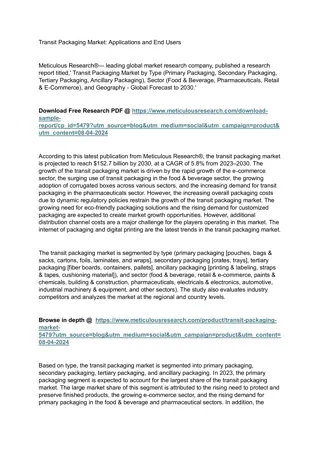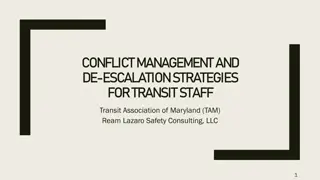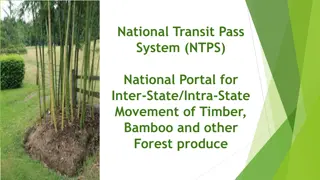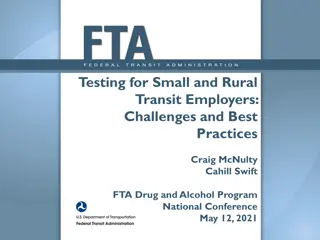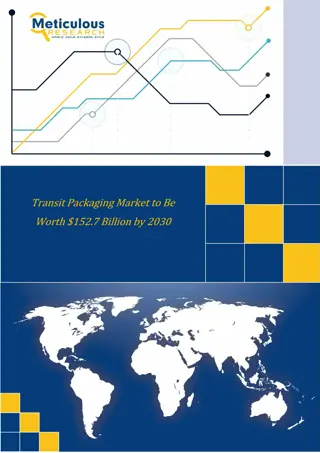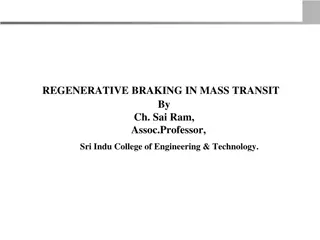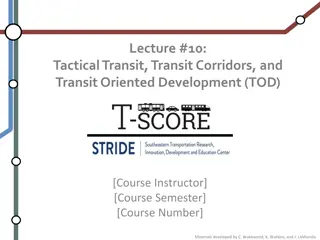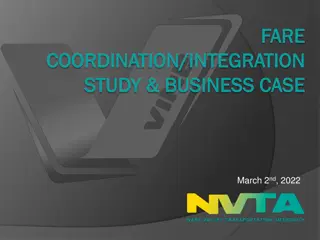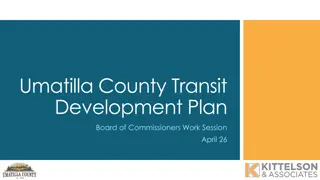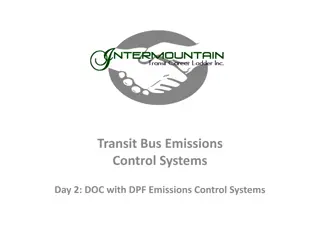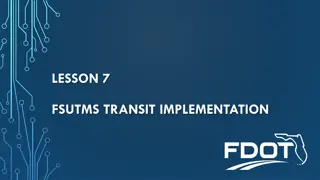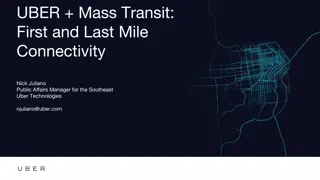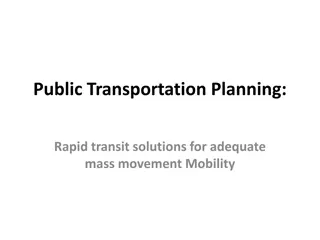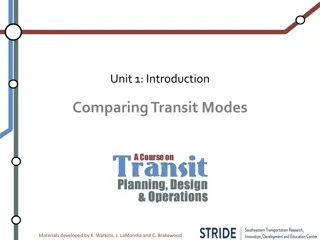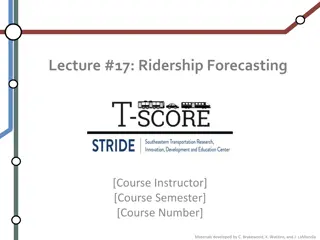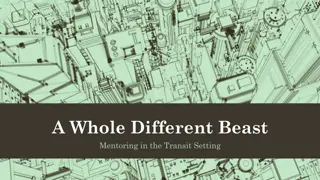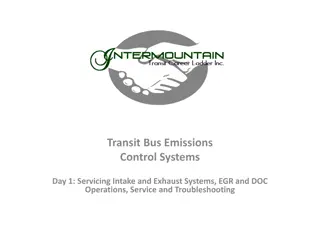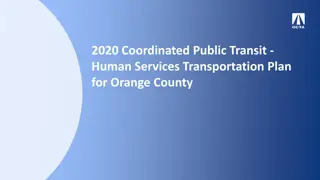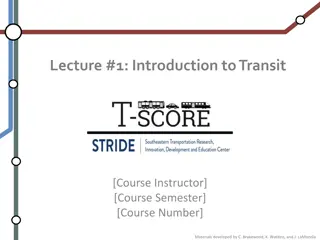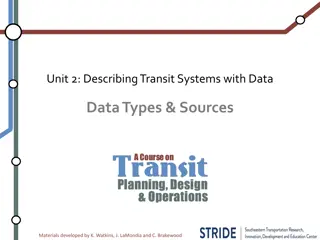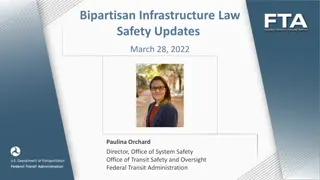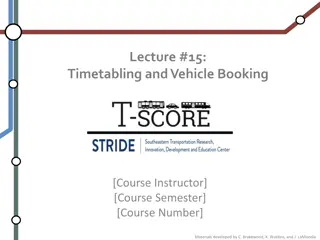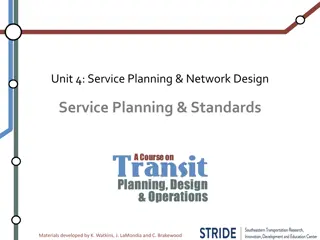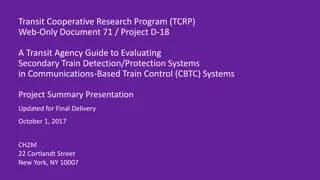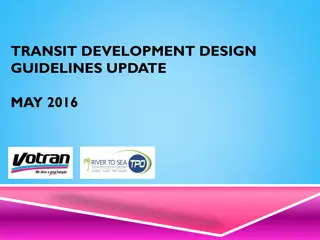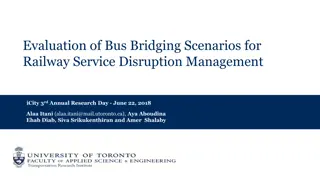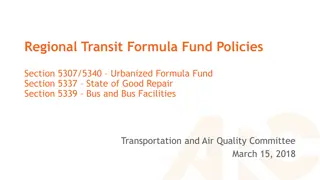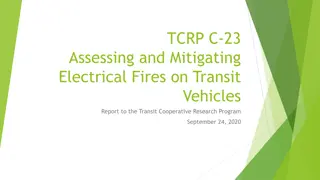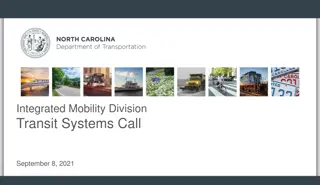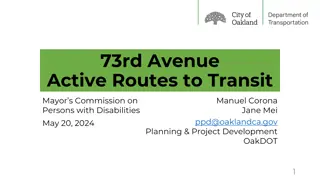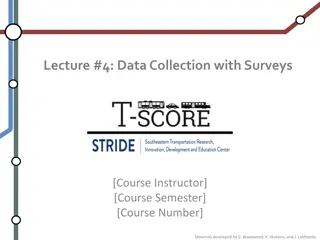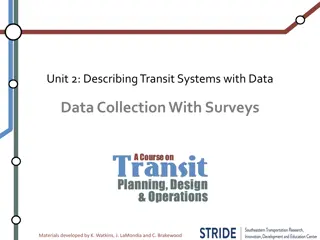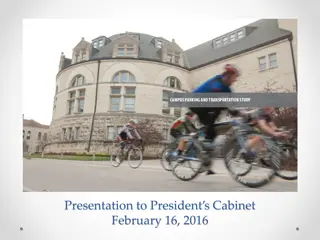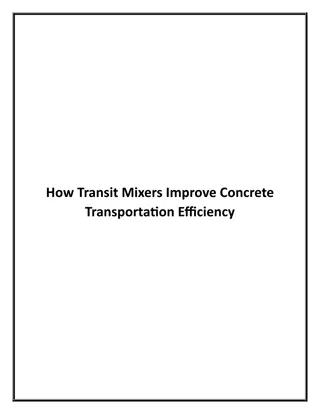Integrity Awareness Training Annual Requirement
Learn about the Federal Transit Subsidy Program that aims to protect the nation's infrastructure, reduce air pollution, and alleviate traffic congestion by encouraging the use of mass transit. Discover the history, approved transportation options, participant roles, and responsibilities to ensure co
0 views • 42 slides
Evolution of Los Angeles Transit Graphics: Past and Present
Explore the rich history of Los Angeles transit through its graphic and design elements, from the iconic liveries and logos of the Yellow Cars to the modern branding efforts of Metro. Witness the transition across the decades, capturing the essence of local transportation evolution.
0 views • 20 slides
Financial Oversight and Corrective Actions in Transit Administration
Financial oversight and corrective actions play a crucial role in ensuring compliance and efficiency in transit administration. The Federal Transit Administration (FTA) Region 9's Office of Financial Management and Program Oversight works diligently to identify common deficiencies through triennial
0 views • 28 slides
Foothill Transit Electric Bus Program Overview
Foothill Transit's electric bus program, led by Roland Cordero, Director of Maintenance & Vehicle Technology, has made significant strides since its inception. With a focus on innovation and sustainability, the program has deployed a fleet of fast-charge and extended-range electric buses across vari
3 views • 17 slides
Transit Packaging Market: Applications and End Users
Meticulous Research\u00ae\u2014 leading global market research company, published a research report titled,' Transit Packaging Market by Type (Primary Packaging, Secondary Packaging, Tertiary Packaging, Ancillary Packaging), Sector (Food & Beverage, Pharmaceuticals, Retail & E-Commerce), and Geograp
1 views • 3 slides
Conflict Management and De-escalation Strategies for Transit Staff
This presentation by the Transit Association of Maryland (TAM) and Ream Lazaro Safety Consulting provides insights into the increasing assault injuries in transit since 2008, definitions of assault, assault types, contributing factors, basic needs of transit passengers, and passenger traits that may
0 views • 57 slides
National Transit Pass System (NTPS) for Forest Produce Transportation
The National Transit Pass System (NTPS) is a digital platform designed to streamline the issuance and monitoring of transit permits for the transportation of timber, bamboo, and other forest produce across states. It aims to replace manual processes, enhance transparency, and facilitate agro-forestr
0 views • 14 slides
Challenges and Best Practices for Small and Rural Transit Employers
Speaker Craig McNulty from Cahill Swift discusses the hurdles faced by small and rural transit employers in carrying out compliant drug and alcohol testing programs. Challenges include workload management, training limitations, unfavorable geography, and the need for qualified service agents. The im
0 views • 42 slides
Rights of Unpaid Seller: Lien and Stoppage in Transit Explained
An unpaid seller of goods has specific rights, such as the right of lien to retain possession until full payment is received and the right of stoppage in transit to reclaim goods during transportation. These rights are crucial for sellers when dealing with non-payment or buyer insolvency scenarios.
0 views • 12 slides
Transit Packaging Market to Be Worth $152.7 Billion by 2030
Transit Packaging Market to Be Worth $152.7 Billion by 2030Transit Packaging Market to Be Worth $152.7 Billion by 2030
0 views • 4 slides
Regenerative Braking in Mass Transit: Harnessing Energy Efficiency
Regenerative braking in mass transit is an energy recovery mechanism that slows down vehicles while converting the generated power for immediate use, storage, or redistribution. This technology, while not entirely new, offers opportunities for increased energy efficiency, reduced maintenance costs,
3 views • 11 slides
Livable Transit Corridors and Transit-Oriented Development
Explore the concept of livable transit corridors and transit-oriented development (TOD) through materials developed by C. Brakewood, K. Watkins, and J. LaMondia. Discover principles, metrics, and best practices for improving livability in transit corridors, including initiating projects, assessing c
0 views • 60 slides
Enhancing Fare Coordination and Integration in Bay Area Transit
A detailed look at the current fare policies and their impact on transit ridership in the Bay Area, highlighting the need for fare coordination and integration to support ridership growth and improve customer experience. Key issues such as optimizing ridership, meeting the needs of Equity Priority C
0 views • 9 slides
Transit Development Plan Overview for Wasco and Umatilla Counties
This document outlines the Transit Development Plans (TDP) for Wasco and Umatilla Counties, focusing on project management, needs assessment, financial cost estimates, implementation plan, public participation, and adoption timelines. It compares executive summaries, history, future vision, baseline
0 views • 18 slides
Understanding Diesel Engine Emissions Control Systems in Transit Buses
This educational material focuses on the operations and components of diesel engine emissions control systems, specifically DOC with DPF systems in transit buses. Learn about the role of exhaust after-treatment, dosing valve injector, diesel oxidation catalyst, and diesel particulate filter. Explore
0 views • 45 slides
Comprehensive Transit Network Implementation Workshop
This workshop covers various aspects of transit network implementation, including transit network coding, mode choice, assignment considerations, and network distribution. It discusses the differences between transit stops and stations, rail station data, and modes of transit access. The workshop al
0 views • 78 slides
Uber's Role in Enhancing Mass Transit Connectivity
Ridesharing is playing a significant role in connecting the first and last mile gaps in mass transit systems, providing a complementary service rather than a substitute. Uber has established partnerships with various transit agencies nationwide, including MARTA, to improve access and reduce costs fo
0 views • 6 slides
Efficient Public Transportation Planning for Mass Mobility
Rapid transit solutions like high-capacity public transportation systems, including overground rail, underground rail, trams, and BRT systems, play a crucial role in enhancing mass movement efficiency. Factors such as journey time, transport costs, vehicle operating costs, and the benefits of rapid
1 views • 20 slides
Understanding Transit Modes: A Comparative Analysis by Watkins, LaMondia, and Brakewood
This study delves into defining transit modes, exploring different families of transit modes, and comparing mode selection in the US. The materials developed by K. Watkins, J. LaMondia, and C. Brakewood provide insights into transit mode characteristics like right-of-way systems, technology types, a
0 views • 43 slides
Understanding Ridership Forecasting for Transit Systems
Explore the essential concepts of ridership forecasting in transit systems, including methods to predict ridership changes, transit travel behavior, and factors influencing travel choices. Learn how understanding ridership helps in making informed decisions for improving transit operations and plann
0 views • 52 slides
Revolutionizing Mentoring in Transit: The B.U.S. Approach
Discover a groundbreaking mentoring initiative in the transit industry - the B.U.S. (Building Up for Success) Mentoring Program. Unveil the evolution of operator mentorship, the inception of B.U.S. mentoring, and the impact on retention metrics. Dive into the development process and explore the curr
0 views • 15 slides
Information Systems in Organizations: Overview and Implementation
Information systems play a crucial role in organizations, encompassing transaction processing systems, functional area information systems, and enterprise resource planning systems. This content delves into the purpose of transaction processing systems, the support provided by information systems ac
0 views • 30 slides
Transit Bus Emissions Control Systems - Day 1: Servicing and Troubleshooting
Explore the intricate components and operations of intake and exhaust systems, EGR, and DOC in transit bus emissions control systems. Learn about new technologies, common services, and troubleshooting techniques to effectively manage emissions and improve engine performance. Delve into the evolution
0 views • 57 slides
Orange County Coordinated Public Transit & Human Services Plan 2020
The Orange County Transportation Authority (OCTA) has developed a Coordinated Public Transit & Human Services Plan that must be updated every four years. The plan includes assessments of available transportation services and needs, strategies to address gaps, and priorities for implementation. Objec
0 views • 13 slides
Understanding Transit Systems: A Comprehensive Overview
Delve into the world of transit with this introductory lecture covering the definition, evolution, and importance of transit systems in the USA. Explore the various forms of transit, from public to private, and their role in collective transportation. Gain insights into the classification of transit
0 views • 29 slides
Exploring Transit Data for Service Improvement
Dive into the world of transit data, where understanding different types such as system-level, route-level, and trip-level data can help in optimizing service quality. Discover the importance of accurate data in making informed decisions for transit systems, from service planning to operational cont
0 views • 46 slides
Bipartisan Infrastructure Law Safety Program Updates
This content discusses the updates to the Federal Transit Administration's safety program in line with the Bipartisan Infrastructure Law. It covers aspects such as the National Public Transportation Safety Plan, Public Transportation Agency Safety Plans, and impacts on the transit industry. The law
0 views • 19 slides
Understanding Timetabling and Vehicle Booking in Transit Planning
Timetabling plays a crucial role in transit operations by determining the schedule for vehicles passing each stop on a route. Efficient timetabling ensures consistent service and helps minimize operating costs. Vehicle blocking, crew scheduling, and other steps are involved in service planning. Chal
0 views • 37 slides
Service Planning and Network Design: Enhancing Transit Quality
Explore the essentials of service planning and network design developed by experts. Dive into the basics of quality transit service, service availability, comfort, convenience, and more to enhance the overall efficiency and effectiveness of transit systems.
0 views • 49 slides
Transit Agency Guide for Evaluating Secondary Train Detection/Protection Systems in CBTC
This project conducted by TCRP aims to provide guidelines for transit agencies to evaluate the necessity of secondary train detection/protection systems or alternative operating practices when implementing Communications-Based Train Control (CBTC) systems. The research team at CH2M has been working
0 views • 48 slides
Transit Development Design Guidelines Update May 2016
Development of standards and processes for constructing transit infrastructure in the built environment, with updates post-2008 including ADA regulations, FDOT handbook, and SunRail implementation. Methodology focuses on future transit corridors within existing service areas and thresholds revised p
0 views • 9 slides
Evaluation of Bus Bridging Scenarios for Railway Service Disruption Management
Public transit disruptions can greatly impact user experience, prompting transit agencies to implement various strategies such as bus bridging. This research evaluates different bus bridging scenarios for railway service disruptions, aiming to develop a decision support tool for transit agencies to
0 views • 18 slides
Urbanized Area Transit Funding and Policies Overview
Detailed information on regional transit formula fund policies, urbanized area formula fund, state of good repair initiatives, and bus transportation programs in the Atlanta Urbanized Area. Includes sub-allocation processes, criteria for fund distribution, project development procedures, and eligibi
0 views • 16 slides
Assessing and Mitigating Electrical Fires on Transit Vehicles
The report details a research project on reducing electrical fires in transit vehicles. It includes phases like literature search, identifying causes, making recommendations, and evaluating fire suppression systems. Through document reviews, limited information was found, mostly on vehicle design wi
0 views • 18 slides
Updates on Integrated Mobility Division Transit Systems and COVID-19 Response
The updates cover various aspects including disbursement of funds, CARES Act implementation, reimbursement claims summary, COVID-19 impact reporting requirements, and TSA mask mandate extension. Information on fund disbursement approval, application deadlines, and payment approvals is provided along
0 views • 42 slides
73rd Avenue Active Routes to Transit Project Overview
The 73rd Avenue Active Routes to Transit project in Oakland aims to prioritize safety and comfort for transit users, pedestrians, and cyclists. It involves connecting 73rd Ave from MacArthur Blvd to International Blvd to key transit centers and implementing improvements identified through community
0 views • 11 slides
Data Collection Methods in Surveys for Transit Rider Feedback
Explore the various types of surveys, methods of sampling, survey content, and instruments used in data collection for transit rider surveys. Learn about longitudinal and cross-sectional surveys, along with different survey methods such as self-administered written questionnaires, personal interview
0 views • 33 slides
Understanding Transit Survey Methods for Data Collection
Explore the various types of surveys used in transit systems, including longitudinal, cross-sectional, and single-point surveys. Learn about different survey modes such as on-board/intercept, telephone, mail, web-based, and smartphones. Understand the advantages and limitations of each survey method
0 views • 32 slides
University Parking and Transit Planning Recommendations
This presentation showcases various recommendations related to parking and transit planning for the university, covering areas such as existing transit systems, parking permit fees, campus parking ratios, and proposed changes for the upcoming years. The suggestions include adjustments to parking lot
0 views • 17 slides
How Transit Mixers Improve Concrete Transportation Efficiency_compressed
A transit mixer mixes cement during its journey. This saves man-hours at site because it can be avoided by mixing by the man-power there. Machines, like the Eicher Transit Mixer, therefore save waste, making for a smooth, cost-effective, and efficien
0 views • 3 slides
